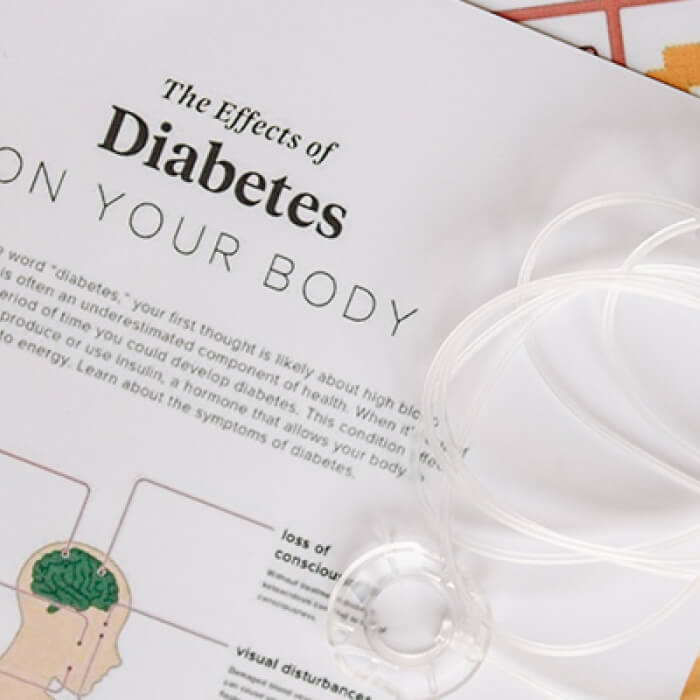Glucerna triple care
- Main Image
-

- Subtitle
- Complete and Balanced Nutrition For People with Diabetes
- Title
- Glucerna® Triple Care
- Detail Page Path
Diabetes Burnout is a natural and rational response to living with this demanding, long-term condition. It affects 44% of people diagnosed with diabetes and, has been consistently linked with higher HbA1c levels.
Symptoms of Diabetes Burnout1 can include:
It is here to stay. Managed well, diabetes will not hinder your life. But, out of control, diabetes damages every organ system in your body – your eyes, kidneys, heart and more – accelerating the onset of disease and death.
Dietary control is one fundamental lever to help you stay within the zone of good control. But, every mouthful you eat, every beverage you sip has the potential to spike your blood sugar level. So, eating right for good blood sugar control is not a sprint but a marathon. Sustained mindful eating will help you stay on course with your diet plan and beat the blood sugar blues.
Here are some tips to win in the long haul.
Will To Win
A healthy life lived well is an important goal for everyone. Having diabetes does not have to stymie that.
Every successful marathon runner will tell you that the battle is more in the mind than the body. Once you have set your heart and mind on living a fulfilled life despite diabetes, you can summon your will to achieve.
Identify what will help you succeed and endure – it could be assembling a great healthcare team that listens, guides and encourages; a diabetes support group that constantly shares and motivates; family and friends that understand and support your long-term glycemic goal. This is because changing and sustaining your diet will require your full attention. From planning the menu, shopping, cooking, eating meals and snacks at home and eating out – stay in control but, lean in on all the support you can get.
“Eat right, exercise more, get your health checked regularly and think twice about picking up that can of soft drink’, said Prime Minister Lee Hsien Loong’s to Singaporeans who want to beat diabetes. “It takes effort and discipline, but it can be done,” he told the audience at the 2017 National Day Rally.
Know The Plan
Your diet plan is unique. Once you have it worked out with your dietitian and fine-tuned it to achieve your blood glucose goal – stay on course! Learn about the timing of meals and snacks and, how that needs to be coordinated with your prescribed medications. Know the food types and portions at each meal and the equivalent swaps. Plan how you can bring the diet strategies to life at home, at work and, when you eat out.
Prepare For Disruptions
Life is unpredictable. When it comes to eating occasions, it is even more so. Your planned pre-packed meal may need to be abandoned for a sudden invitation to lunch from your boss. Work deadlines may overwrite your preparations for a home-cooked dinner. Sometimes the problem could just be you. For example, you planned only to eat 3 seeds of durian but looking at the generous portion before you, your resistance crumbles and you indulge; your mum prepares your favourite dish and hovers around you to see you enjoy and you give in.
Understand Why
Adhering to your diet or goofing off the plan may have deep rooted reasons beyond just the availability of food or the disruptions caused by the occasions or people around you. Are you overeating because you are bored, sad or alone? Are you indulging because you are hanging out with foodies most of the time? Food is very tempting and, being surrounded by it makes it difficult to navigate. “The pleasures of a slice of chocolate cake are immediate, while the costs to health are hidden and set in much later, but with potentially severe consequences,” said Prime Minister Tharman Shanmugaratnam at a Ministerial Conference on Diabetes held in Singapore on November 2018.
Keeping a food diary and recording what and how much you ate, as well as the occasions, your feelings and emotions while eating will help you identify your strengths and weaknesses so that you can shore up the right defences for diet success.
Be Flexible
Diet plans are good. But, being flexible in terms of implementing the diet plan will make you successful. Be knowledgeable and skilled about swapping foods and portions so that you can always stay in glycemic control no matter where and when you eat. Prepare for contingencies by carrying a healthy snack or beverage, don’t overeat even if the portion in front of you is large – ask for the extras to be packed for a later meal or snack. Expand and personalise this diet survival guide to ensure that, overall, you are in control.
Get Back On Course
One-off disruptions will impact you blood glucose post-meal but it should not throw you off your path to success. But if it happens frequently, you may need a new plan to stay on course with your diet plan and achieve your goal. With diabetes, for success, the fable of the hare and the tortoise rings true. Small but, sustained changes will make an enormous difference.
Get Support
Speak up to your healthcare team and family when you feel upset and angry about the demands diabetes is placing on your food choices and lifestyle. It is natural to feel upset about diabetes, but never give up, rework your goals and, allow for some balance. Vary your diet plan, explore new recipes and, eat out with a diabetes support group. Small wins each day are better than completely giving up.
Eating healthy and well-balanced meals and snacks that are carbs controlled and made up of low GI foods takes discipline but it can be done. However, if you are not achieving your goals and are struggling with blood glucose highs and lows, don’t beat yourself up about it. Maybe a diabetes-specific formula as part of your individualised meal plan may help you achieve better glycemic control with greater confidence and ease.
Designed for people with diabetes, diabetes-specific formulas deliver complete and balanced nutrition and are scientifically designed with slowly absorbed carbohydrates to be low GI as well. Here’s how you may include it in your individualised meal plan:
Your state of mind helps when it comes to diabetes control. Build your self-confidence to better manage your condition.
What does confidence have to do with controlling diabetes? Plenty! Research has taught us a few things about the role confidence plays in diabetes control.
A person’s confidence in his or her ability to change their behaviour – like eating more fruits and vegetables and walking daily – is a predictor of whether that person will reach his or her goals. Several studies show that people who believe in their ability to lose weight tend to lose more weight than those who don’t.
The good news is that confidence can be learned.
People have different levels of confidence when it comes to diabetes control. You may feel confident that you can eat more fruits and vegetables, but not at all confident about turning down dessert at a restaurant. Other people may feel confident about being able to increase their activity level by walking more, but not feel confident about their ability to add weight training to their programme.
“Great!” you say. “My health is important to me, and I want to control my diabetes! Where can I get some of this confidence?” The not-so-easy answer is – it comes from you.
Taking two important steps will help you boost your confidence:
Acquiring the confidence to change the old for the new happens in different ways for different people. Here are some ways for you to discover and cultivate your own confidence to change.
Go for it: Success breeds confidence. A good way to boost your confidence to make lifestyle changes is to do exactly what it is that you think you can’t do. You’ll see that you have what it takes. If you’re not feeling confident about getting out for a brisk walk, try it for just one day.
Build on your past successes and failures. Think back on earlier attempts to control your glucose levels. What success did you have, and what contributed to that success? What did you learn from that experience? What obstacles kept you from going down the path to your goals?
Be a copycat. Find role models and imitate their behaviour. See a person turn down dessert at a restaurant? Try it yourself. There’s power in saying, “If they can do it, I can do it!”
Listen to what others say about you. Positive comments and words of encouragement from friends and family can boost your confidence and your resolve to change. Listen to yourself too, if your self-talk is positive and constructive.
Change is all about doing. It helps to read about confidence and ways to improve one’s level of confidence to try new things. It’s better to use what you read. Do something with it. What can you do to boost your confidence to make healthier food choices and get more physical activity?
Emotions can be powerful, and for many of us, they can make us eat. Food can be comforting, but it can also prevent you from tackling your diabetes.
You may be thinking, if emotional eating is so deeply engrained, can anything be done to change it? Follow the AAA strategy: Be Aware, Avoid Triggers, and Look for Alternatives. Here’s how this tool can help:
Be Aware.
Be aware and alert in situations that trigger your emotions and do not let the emotions of the moment make you forget your goals. Pause and ask yourself whether the short-term comfort of uncontrolled eating or missing your planned exercise is worth the long-term impact on your diabetes control programme.
Avoid Triggers.
Obviously, you can’t avoid all situations that trigger you to compromise your goals. But you can avoid some people who push your emotional buttons and stress you out. If you’re stressed out from having too many balls in the air, let one or two drop and take some time for yourself.
Look for Alternatives.
When you can’t avoid the situations that trigger emotional responses, you can look for better ways to respond to them. Write in your journal and describe the situation that pushed your buttons. Make a change in your physical activity, try meditation: even a warm bath is better than beer and chips. If your emotional state calls for food, however, be ready. Make sure you have healthy snacks in your fridge and cupboard, or just eat a very small portion of the food you’re craving.
References:
1 Source: Accessed on 23 November 2019 at https://www.diabetes.org.uk/Guide-to-diabetes/Life-with-diabetes/Diabetes-burnout
SG.2022.29988.GLU.1 (V1.1)

Your every food choice matters. With the food environment around you evolving daily, are you still getting your diet foundation right?

Fluctuations in blood glucose levels may contribute to fatigue in people with diabetes. Find out what you can do to help maintain steady energy through the day.

Diabetes burnout is a natural and rational response to living with the demanding, long-term condition of diabetes.

Are you finding it difficult to cope with diabetes burnout? Find out how to be in control of your Type 2 Diabetes.
You are about to exit for another Abbott country or region specific website.
Please be aware that the website you have requested is intended for the residents of a particular country or region, as noted on that site. As a result, the site may contain information on pharmaceuticals, medical devices and other products or uses of those products that are not approved in other countries or regions.
The website you have requested also may not be optimized for your specific screen size.
Do you wish to continue and exit this website?